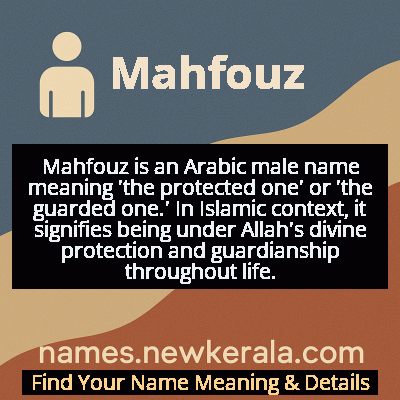Mahfouz Name Meaning & Details
Origin, Popularity, Numerology Analysis & Name Meaning of Mahfouz
Discover the origin, meaning, and cultural significance of the name MAHFOUZ. Delve into its historical roots and explore the lasting impact it has had on communities and traditions.
Name
Mahfouz
Gender
Male
Origin
Muslim
Lucky Number
9
Meaning of the Name - Mahfouz
Mahfouz is an Arabic male name meaning 'the protected one' or 'the guarded one.' In Islamic context, it signifies being under Allah's divine protection and guardianship throughout life.
Mahfouz - Complete Numerology Analysis
Your Numerology Number
Based on Pythagorean Numerology System
Ruling Planet
Mars
Positive Nature
Generous, passionate, energetic, and humanitarian.
Negative Traits
Impulsive, impatient, moody, and can be overly emotional.
Lucky Colours
Red, maroon, scarlet.
Lucky Days
Tuesday.
Lucky Stones
Red coral, garnet.
Harmony Numbers
1, 2, 3, 6.
Best Suited Professions
Military, sports, philanthropy, leadership roles.
What People Like About You
Courage, energy, leadership, generosity.
Famous People Named Mahfouz
Naguib Mahfouz
Writer
First Arabic-language writer to win Nobel Prize in Literature
Mahfouz Ould El-Walid
Islamic Scholar
Prominent religious figure and former Al-Qaeda spokesperson
Mahfouz Adedimeji
Actor
Award-winning Nollywood actor known for versatile performances
Name Variations & International Equivalents
Click on blue names to explore their detailed meanings. Gray names with will be available soon.
Cultural & Historical Significance
Extended Personality Analysis
People named Mahfouz are typically characterized by their protective nature and strong sense of responsibility. They often emerge as natural caretakers in their families and communities, displaying unwavering commitment to those under their care. Their protective instincts are balanced with wisdom and patience, making them excellent mediators and trusted advisors. Mahfouz tends to be methodical and thoughtful in their approach to life, preferring stability over rash decisions. They possess a deep inner strength that allows them to remain calm during crises, providing reassurance to others. While they value tradition and established ways, they are not rigidly conservative but rather seek to preserve what is truly valuable while adapting to necessary changes. Their reliability and consistency make them pillars in their social and professional circles.
Modern Usage & Popularity
In contemporary usage, Mahfouz maintains a steady presence as a traditional Muslim name with deep religious resonance. While it doesn't rank among the most popular names in any particular region, it continues to be chosen by families who value its spiritual significance and cultural heritage. The name sees consistent usage across the Arab world, particularly in Egypt where Nobel laureate Naguib Mahfouz brought it international recognition. Among Muslim diaspora communities in Western countries, Mahfouz serves as a meaningful connection to cultural roots while being distinctive enough to stand out. Modern parents selecting this name often appreciate its timeless quality and the positive values it represents, though some may opt for more contemporary variations. The name's usage reflects a balance between religious tradition and personal significance rather than following naming trends.
Symbolic & Spiritual Meanings
Symbolically, Mahfouz represents the intersection of divine protection and human responsibility. It signifies being under God's guardianship while also carrying the duty to protect and preserve what is valuable in one's community and tradition. The name metaphorically suggests a safeguarded existence that extends beyond physical safety to include spiritual, emotional, and intellectual protection. It embodies the idea that true security comes from faith and righteous living rather than external circumstances. Mahfouz also symbolizes the preservation of heritage, knowledge, and moral values across generations, representing a living link between past wisdom and future possibilities. The name carries the profound message that those who are protected are called to become protectors themselves, creating a cycle of care and preservation that strengthens communities.

